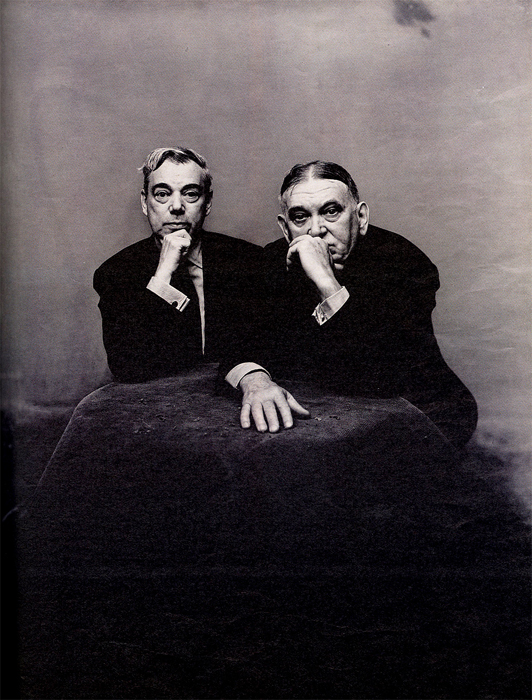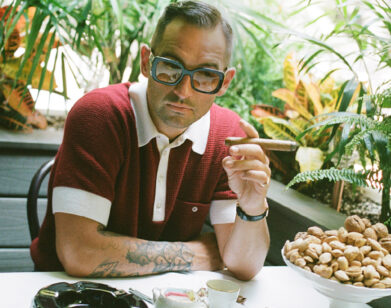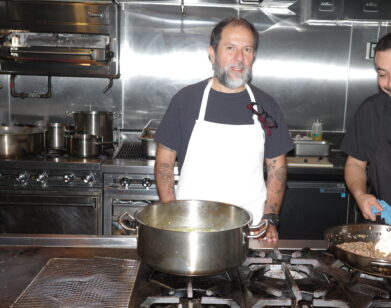From the Archive: Remembering Irving Penn

Irving Penn by Horst, 1951
Irving Penn died today at the age of 92. Penn was a beloved contributor to Interview, among many other magazines. Here we reproduce Jeffrey Slonim’s tribute, (published June 1995) to 50 years in the career of America’s greatest portrait photographer. And we would just keep on rolling:
For the past fifty years, photographer Irving Penn has recorded the world with intelligence, gentle humor, respect, and grace. Whether it’s the faces of writers, models artists, actors, whether it’s the unseen guedras of Morocco, whether it’s apples rotting. Poppies popping, croissants crumbling, or frozen-food balancing, this artist has managed to prove that everything on earth can rise to the occasion of being looked at as if the eyes looking are eyes that see with understanding. By portraying some of his subjects between walls or jamming them up against a table, as if to squeeze out the inner self, Penn developed a concentrated gaze into the core of human nature, and at the same time created some of the most existential works of this century. Though he has never been one to focus on himself, in appreciation of what his photographic genius has given to so many, and on the occasion of his seventy-eighth birthday, we spoke with a few of his subjects, fellow photographers, and friends about the artist behind the lens.
Carmen Dell’ Orefice (model): I first worked with Irving Penn in 1945. I was thirteen. I don’t think I was as interesting as Brooke Shields at that age. It took Irving Penn to see something in me. I was a very closed, quiet child. I had been ill with rheumatic fever, and because he knew we were so poor, Penn would book me for a whole day of work and often only use me for an hour or two. He was very caring.
Two Men in White Masks, Cuzco Peru 1948
Helmut Newton (photographer): He’s a great master and a fantastic man. I am in awe of him. Even more power to you, Mr. Penn.
Polly Mellen (creative director, Allure): What I remember are his soul and caring, the intensity of this man, the passion, the obsession for perfection. There are so many images that I have in my mind of Penn’s work-the nudes that he did of very plump women, and one of them has a smile across her stomach. None of the men and women who took the opportunity to be photographed in the nude by Irving Penn are really naked, because of his lighting. You know, the way you feel when the sun touches your body early in the season, and you don’t feel naked because there’s a warmth that goes along with it. That’s my message to Penn…the warmth. Thank you for the warmth, and the learning.
Bruce Weber (photographer): When things are going really badly on location or in my studio, I think of Mr. Penn in the wilds of Africa. Even after he had finished shooting, he would never stay there for a vacation, but would bring his photographs home, because the heat and other conditions would ruin them if he stayed. And he never wanted to send the pictures with an assistant; he always wanted to bring them back himself. I’ve always loved his dedication to photography and felt that it is totally honest, extraordinarily pure.
Issey Miyake (designer): I’ve admired Mr. Penn’s photographs from the time I was a student; I still cannot believe sometimes that I have this special creative exchange with him. Mr. Penn’s photographs excite and inspire me, and his visions have given me the courage to go beyond the boundaries of clothing. Our collaboration has been one of the highlights of my career and is a very special part of my life.
Naomi Campbell (model): I was terrified the first time we worked together. I was worried about being able to keep still, because I fidget quite a lot, When you’re working with him, he wants you to look at a certain part of the room, and he always says, “See something.” When I work with him, I feel very elegant and beautiful.
Rei Kawakubo (designer): I have always respected the simplicity of Irving Penn’s photographs.
Lauren Hutton (model and talk show host): Penn’s shoots were like being on a Petri dish. You got a chance to evolve. He would as us these very pointed questions, and you’d have to think a lot about them. Penn was our Socrates, except that he was a good looking Socrates and he liked girls.(LEFT: GEORGE JEAN NATHAN AND H.L .MENCKEN, NEW YORK, 1947)
Ellen von Unwerth (photographer): I very much admire the pictures he did in South America of Indian people in tents. I like the way he photographed them in that self-made portable studio-so strong, so unexpected. And I am taken by his large close-ups of cigarette butts. They are such an ugly thing, and he took the time to photograph them and make them so beautiful.
Frances McLaughlin Gill (photographer): Penn shares some qualities with Hamlet, but not the self-destructive ones. The self is extremely important to him. His light enhances his subjects. Whenever I se those Penn photos of Lisa Fonssagrives-Penn [Penn’s wife, who died in 1992] at the Paris collections, my heart beats a little faster.
Iman and David Bowie (pop icons): Mr. Penn was quite possibly the quietest photographer we have ever worked with. His silence spoke volumes. It questioned, poked, turned, executed cartwheels of curiosity, and probably judged. We felt we were in the company of a scion of a founding family, very aristocratic, just so. He took maybe seven or eight shots. The result is refined, not too intrusive, and quite beautiful, just so.
Horst (photographer): I am so happy that Lisa and Irving were lucky enough to live such a long, happy life together. It’s meant so much to me that he made Lisa happy, and in turn she made Irving happy. I have a great deal of admiration for Penn. I’ve always admired the technical aspects of his photography.
Sophia Loren (actress): It was a lucky event for me to meet him in the first years of my career. Undoubtedly his pictures of me sent an image of beauty around the world [that was even] unknown to myself. Irving is an authentic artist. He “creates” images; he helps you find your most intimate and true self.






